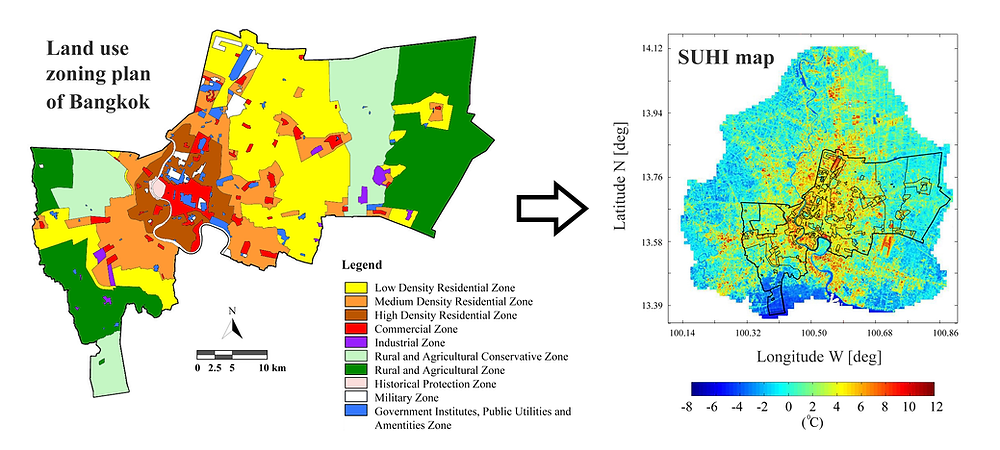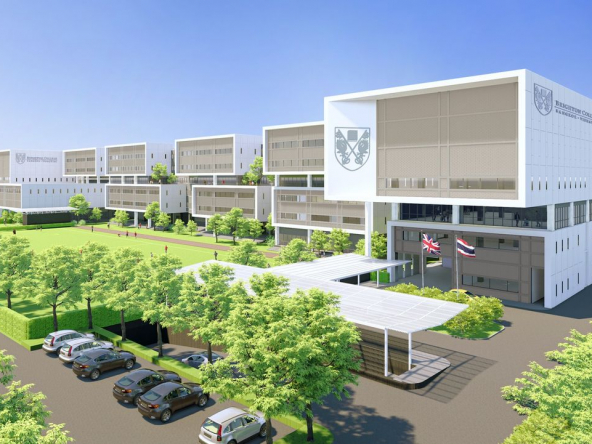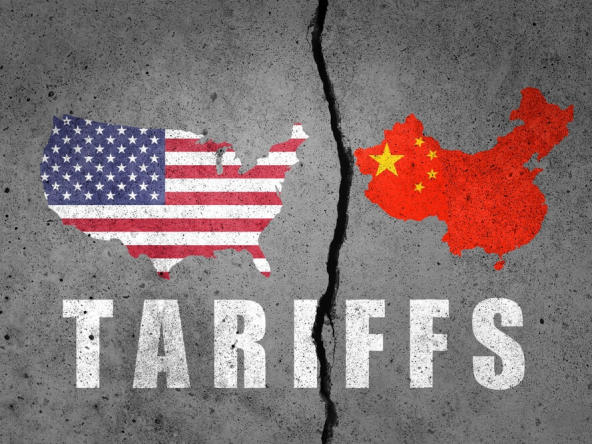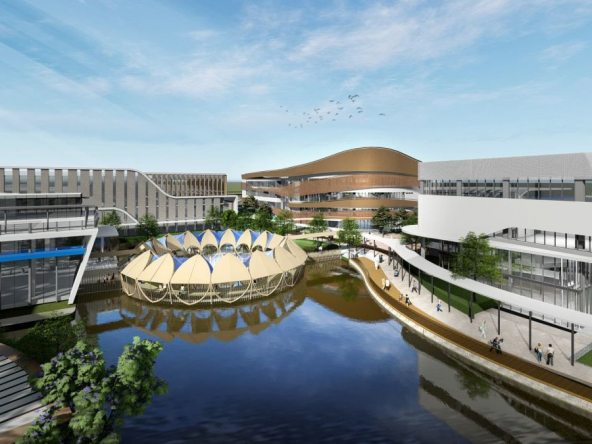Understanding land zoning in Thailand, especially with the regulations and rules set for 2025, can feel like a maze. Many find themselves puzzled by the extensive array of categories and criteria that define where and what you can build.
Whether you’re an industrial operator eyeing expansion or a family planning to buy your dream home, grasping the ins and outs of land use regulations is crucial.
Did you know that Thailand’s zoning laws are color-coded? This unique system categorizes areas into different purposes such as residential, commercial, and industrial uses. To help navigate through this colorful yet complex landscape, our article sheds light on city plans, and building codes.
Get ready to unravel the puzzle of Land Zoning Thailand!
City Plan and Zoning in Thailand
City plan and zoning in Thailand serve to designate specific areas for different purposes, such as residential, commercial, or industrial use. The types of zoning categories including purple, and red play a crucial role in regulating land usage within the country.
Purpose and importance of city plan and zoning
City plans and zoning regulations play a central role in organizing urban growth and development effectively. These guidelines ensure that land use aligns with community goals, environmental regulations, and land-use policy, laying the groundwork for sustainable city living.
By setting out rules for property buying and selling, industrial operations, and low-income housing projects, zoning ordinances help maintain balance between residential tranquility and commercial activity.
They protect natural resources while fostering economic development, ensuring real estate laws serve both current citizens and future generations.
Zoning ordinances also dictate building regulations within different zones to promote public safety and welfare. For instance, criteria for land use distinguish areas designated for commercial buildings from those reserved for residential or industrial purposes.
This segregation minimizes conflicts between incompatible land uses, enhancing quality of life. Moreover, through careful urban planning and adherence to these principles laid out in city plans along with specific environmental regulations indicated in zoning categories like green, yellow, purple, red zones – cities can guide their expansion in an orderly manner that accommodates population growth without straining infrastructure or degrading natural environments.
Types of zoning categories (green, yellow, purple, red)
The zoning categories in Thailand are color-coded, with each color representing a specific land use designation. All the purple zone areas are Industrial and warehouse land (A.1-A.3). Housing can be built in these areas such as single-family homes, dormitories, or small condominiums including being able to create a store. However, high-rise buildings and large condominiums cannot be built in this zone.
The Pink Zones are mixed-use areas where residential, commercial, and sometimes light industrial activities are allowed.
Red Zones are primarily intended for commercial use, such as business, trade, service, and recreation centers, where housing can be built, and they have the fewest limitations.
These zoning categories are crucial in guiding urban development, ensuring that land is used efficiently while addressing social and environmental needs. Understanding these designations is essential for developers and investors seeking to comply with regulations and make informed decisions about property development projects in Thailand’s ever-evolving real estate market.
Full List of Thai Land Zone Colors and Categories
In Thailand, land zones are often classified using different color codes in zoning maps, which indicate specific land use regulations. Here are the common land zone colors and their meanings:
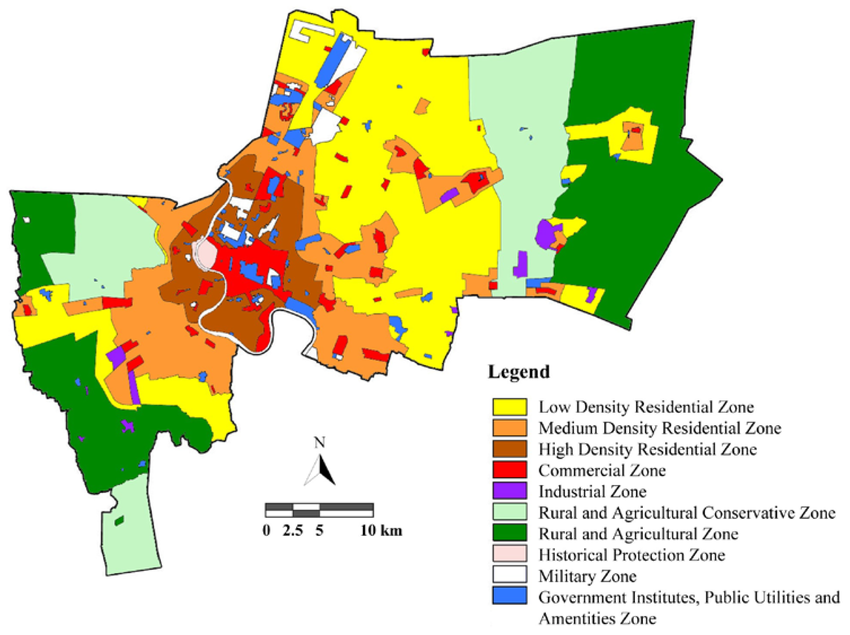
- Yellow Zone (สีเหลือง – Residential Area)
- Primarily for low-density residential areas.
- Usually permits the construction of single-family homes or low-rise buildings.
- Orange Zone (สีส้ม – Residential Area)
- For medium-density residential areas.
- Typically allows the construction of medium-rise residential buildings, such as townhouses and small apartments.
- Brown Zone (สีน้ำตาล – Residential Area)
- High-density residential area.
- Allows for the construction of high-rise apartments and condominiums.
- Red Zone (สีแดง – Commercial Area)
- Designated for commercial activities.
- Allows for the construction of shopping centers, office buildings, hotels, and other commercial establishments.
- Purple Zone (สีม่วง – Industrial Area)
- Industrial zones for factories, manufacturing plants, and other industrial activities.
- May include specific sub-categories for heavy and light industries.
- Green Zone (สีเขียว – Agricultural Area)
- Agricultural and rural zones.
- Primarily for farming, agriculture, food processing, and other types of non-polluting manufacturing and related activities. Restrictions on construction are typically in place to preserve agricultural land.
- White-Green Striped Zone (สีขาวมีแถบเขียว – Conservation Area)
- Conservation and environmental protection areas.
- Often used for parks, forests, and other natural reserves. Strict regulations are in place to prevent development.
- Blue Zone (สีน้ำเงิน – Government and Institution Area)
- Zones designated for government buildings, schools, hospitals, and other institutional facilities.
- Pink Zone (สีชมพู – Mixed-Use Area)
- Mixed-use areas where residential, commercial, and sometimes light industrial activities are allowed.
- Dark Green Zone (สีเขียวเข้ม – Forest Conservation Area)
- Strictly protected forest conservation areas.
- Development is highly restricted or prohibited to preserve natural resources.
- Light Purple Zone (Specific Industrial Zone)
- An industrial zone is designed for a specific purpose or industry.
- A good example would be a communal waste site designated for waste recycling businesses.
These color codes can vary slightly depending on the specific zoning regulations of different provinces or municipalities in Thailand. It’s essential to consult local zoning maps for precise information related to a specific area.
Land Use Planning and Development Laws
Local authorities play a crucial role in designating land use zones, guided by the Ministerial Regulations under the Town Planning Act B.E. 2518.
Role of local authorities in designating land use zones
Local authorities play a crucial role in designating land use zones, ensuring that they align with the city plan and zoning regulations. They are responsible for assessing various factors such as population density, infrastructure development, and environmental considerations to determine suitable zones for residential, commercial, industrial, or agricultural purposes.
By enforcing these regulations under the Town Planning Act B.E. 2518 and Ministerial Regulations, local authorities contribute to the orderly development of urban areas in Thailand.
In addition to ensuring compliance with land use planning laws, local authorities actively engage with stakeholders to gather input on future developments and zoning changes. This collaborative approach helps address the diverse needs of communities while promoting sustainable and balanced growth in different regions of Thailand.
Moving onto Building Codes and Regulations in Thailand…
Ministerial Regulations under the Town Planning Act B.E. 2518
Moving from the local authorities’ role in designating land use zones, the Ministerial Regulations under the Town Planning Act B.E. 2518 play a crucial role in shaping land use planning and development laws in Thailand.
These regulations provide specific guidelines for zoning categories such as purple, and red, setting out the criteria for land use restrictions and property development within each category.
The Act also outlines the procedures for obtaining construction permits and licenses required for building within these designated zones.
These Ministerial Regulations serve as a framework that ensures compliance with city plans while addressing the ever-evolving needs of urban development in Thailand. They underpin the legal aspects of property development regulations and offer clarity on factors influencing industrial operators, low-income housing projects, and commercial building rules within different zoning categories.
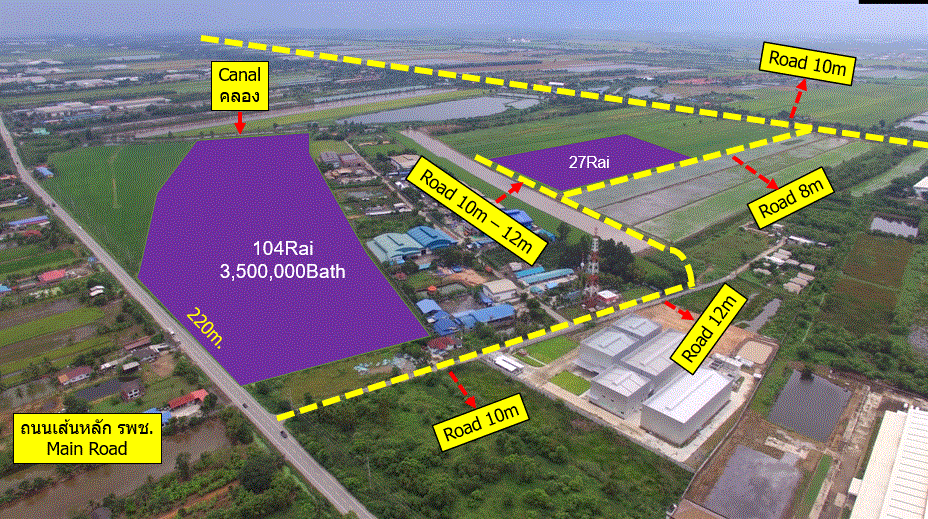
Building Codes and Regulations in Thailand
The criteria for construction permits in Thailand are strict. There are specific licenses and permits required for building, which must be obtained before starting any construction project.
Criteria for construction permits
To obtain a construction permit in Thailand, developers must adhere to specific criteria set by the authorities. These criteria include compliance with building codes and regulations, ensuring the safety of structures, and obtaining necessary licenses and permits.
Additionally, developers may need to submit detailed plans for their construction projects, including design specifications and environmental impact assessments.
Meeting these criteria is essential for securing a construction permit and proceeding with land development projects in Thailand. Developers should also be aware of any specific requirements related to low-income housing projects or other types of land use policy initiatives that may apply to their proposed developments.
Licenses and permits required for building
To ensure compliance with building codes and regulations in Thailand, obtaining the necessary licenses and permits is crucial. The criteria for construction permits include adhering to specific land use criteria, such as zoning requirements and environmental impact assessments.
In addition, low-income housing projects are subject to their own set of regulations.
For instance, the process may require approval from various authorities, including local governments and relevant ministries. Moreover, any planned construction must align with the land development regulations within designated zones.
This process underpins the ever-evolving realm of land use planning and development laws in Thailand.
Final Thoughts on Land Zoning in Thailand
Understanding land zoning regulations in Thailand is crucial for developers and property owners. City plans and zoning categories play a vital role in governing land-use planning and development laws.
With the ever-changing regulations, navigating building codes requires diligence and expertise. When it comes to land use and zoning issues in Thailand, you can get advice from professionals in the district and land offices, and engineers working in construction or those who have planning knowledge in Thailand.
At Hero Realtor Bangkok, we are always on hand to help our clients and to point them in the right direction when they need expert advice on Land Zoning in Thailand.


